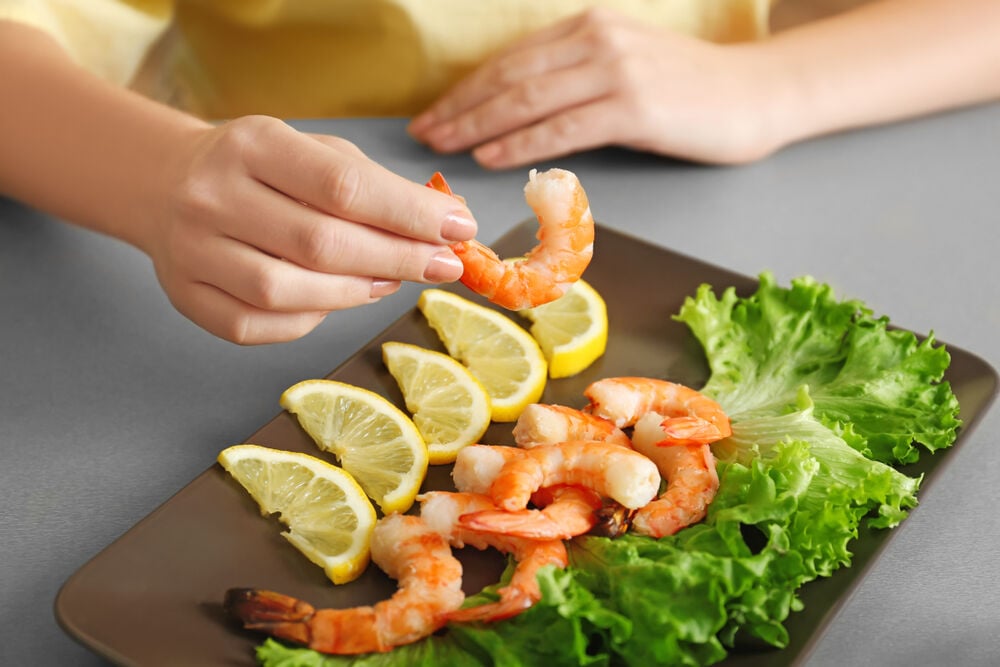If you’re pregnant or trying to conceive, you’ve probably seen a list of foods that you should avoid while pregnant or breastfeeding. It’s best to follow your doctor’s orders, but if you’re wondering if you can eat sushi or shrimp, read on. Our guide will help answer common questions about the role of seafood in a healthy pregnancy diet.
-
Tracking cycle
-
Getting pregnant
-
Pregnancy
-
Help Center
-
Flo for Partners
-
Anonymous Mode
-
Flo app reviews
-
Flo Premium New
-
Secret Chats New
-
Symptom Checker New
-
Your cycle
-
Health 360°
-
Getting pregnant
-
Pregnancy
-
Being a mom
-
LGBTQ+
-
Quizzes
-
Ovulation calculator
-
hCG calculator
-
Pregnancy test calculator
-
Menstrual cycle calculator
-
Period calculator
-
Implantation calculator
-
Pregnancy weeks to months calculator
-
Pregnancy due date calculator
-
IVF and FET due date calculator
-
Due date calculator by ultrasound
-
Medical Affairs
-
Science & Research
-
Pass It On Project New
-
Privacy Portal
-
Press Center
-
Flo Accuracy
-
Careers
-
Contact Us
Can Pregnant Women Eat Shrimp?


Every piece of content at Flo Health adheres to the highest editorial standards for language, style, and medical accuracy. To learn what we do to deliver the best health and lifestyle insights to you, check out our content review principles.
Can pregnant women eat shrimp?
The short answer is yes, you can eat shrimp while you’re pregnant. Shrimp is a healthy food for pregnant women because it is high in protein and doesn’t have an overly fishy taste, which some women have an aversion to while pregnant. For pregnant women experiencing nausea, eating shrimp may be a better lean protein option than other types of fish.
Most of the warnings about eating fish during pregnancy are related to the mercury content of some fish. Too much mercury, when ingested, can transfer through the placenta and cause birth defects. Shrimp, however, has a fairly low mercury count, so it’s safe to eat in moderation. However, shrimp does have some residual mercury, so it’s best to limit your portions to no more than 8 to 12 ounces per week (about three-quarters of a pound or two to three servings per week).
If you’re preparing shrimp at home, make sure that it’s thoroughly cooked, which means milky white all the way through (raw shrimp is typically gray). If you’re cooking raw shrimp, make sure to thoroughly rinse them in cold water beforehand, remove the heads, legs, shells, tails, and intestinal tract along the back ridge of the shrimp. Wash your hands thoroughly afterward to prevent spreading or ingesting any bacteria from the raw shrimp. If you’re ordering shrimp at a restaurant, make sure the restaurant has good food safety standards and tell your server that you’re pregnant when ordering.
It’s okay to eat cold shrimp, like shrimp cocktail, as long as the shrimp have been cooked thoroughly beforehand. The temperature of the shrimp after the cooking process is what matters. Once the shrimp has been cooked, you can chill it for a refreshing cocktail dish.
If you’re wondering if you can eat sushi while you’re pregnant, you’re in luck. Many different types of sushi rolls are made with seafood that has been cooked, such as crab or tempura shrimp. So if sushi is something that you enjoy, you can still satisfy your pregnancy craving. Double-check each roll and the ingredients to make sure that the shrimp or other fish is well cooked. Crab cakes are also an option if you’re craving crab.
Benefits of eating seafood during pregnancy

Your baby’s brain and nervous system develop rapidly during the gestation process, mostly during the first trimester. Foods that are rich in omega-3 fatty acids, especially DHA and EPA, are critical to the formation of your baby’s healthy brain. Omega-3 fatty acids are also essential for eye development and good eyesight. Research shows that pregnant women who take omega-3 supplements or as dietary additions in food have a lower risk of preterm (less than 37 weeks) or early preterm (less than 34 weeks) birth, and their babies have a reduced risk of low birthweight. These fatty acids are essential to a healthy pregnancy, and eating seafood during pregnancy is a great way to naturally get the nutrients that you and your baby need.
Take a quiz
Find out what you can do with our Health Assistant
Foods that are rich in omega-3 fatty acids, especially DHA and EPA, are critical to the formation of your baby’s healthy brain.
Seafood is one of the best sources of omega-3 fatty acids. Most fish and shellfish are rich in these nutrients and can help reduce the need for supplements during pregnancy. Seafood has other essential nutrients, such as calcium, vitamin D, and iron. Iron is especially important for pregnant women. It’s not uncommon for pregnant women to develop iron deficiencies. Your body produces a higher volume of blood during this time, making it more likely to become anemic.
What seafood to avoid during pregnancy
Although tuna may be a favorite food for many women, whether it be an ahi steak or a tuna melt, it’s better to limit the amount of tuna while pregnant. If you do eat tuna, it’s better to consume light canned tuna. Tuna has a higher mercury count than other fish, mainly due to its size. Larger fish live longer, and the mercury in the ocean leaches into their flesh. This mercury can be transferred to you when you eat it.
While mercury in fish isn’t harmful to most people in moderate amounts, it’s much riskier for pregnant women. Ingesting too much mercury during pregnancy can cause vision problems, hearing problems, and brain damage for the fetus. Excessive mercury in adults can result in liver or kidney failure, as well as damage to the nervous system — the brain, spine, and nerve endings. Too much mercury when you’re pregnant can lead to birth defects severe enough that you may miscarry.
Shark, swordfish, tilefish, and mackerel are among the fish that have the highest amounts of mercury in their flesh. If you’re pregnant, the Food and Drug Administration encourages you to avoid these types of fish entirely. If you’re dining out, make sure to ask about ingredients in dishes with multiple types of fish or seafood, such as paella, cioppino, or pasta tutto mare. These dishes may have chunks of swordfish or tilefish in them, as well as other types of fish that have medium amounts of mercury.
While mercury in fish isn’t harmful to most people in moderate amounts, it’s much riskier for pregnant women. Ingesting too much mercury during pregnancy can cause vision problems, hearing problems, and brain damage for the fetus.
Lots of pregnant women wonder if they can eat sushi. Cooked sushi is usually okay. However, raw fish (sashimi) and sushi rolls and nigiri that contain mainly raw fish with rice are generally off-limits. All seafood dishes should be cooked to 145 degrees Fahrenheit. Uncooked fish is more likely to contain parasites and bacteria, both of which are killed during the cooking process. Listeria, in particular, is very common in uncooked fish. While your immune system is able to fight it off when you aren’t pregnant, during gestation, it’s best to avoid the risk.
Pregnant women have a weaker immune system than other women. Therefore, it’s important to refrain from eating foods that aren’t fully cooked, and this includes most sushi. Foodborne illnesses are harder to fight off while pregnant, and even though the bacteria or parasite itself may not directly harm the baby, food poisoning can damage your health and affect your ability to nourish your baby. You’re more susceptible to the harmful effects of different microorganisms while pregnant.
The takeaway
Eating shrimp and other seafood during pregnancy isn’t necessarily a no-no. However, you should be careful about how much and what types of seafood you eat while pregnant. If you do choose to eat seafood, especially if it has a light to medium-high level of mercury, make sure to keep careful track of how much you eat to ensure you aren’t exposing yourself or your baby to too much mercury.


Hey, I'm Anique
I started using Flo app to track my period and ovulation because we wanted to have a baby.


The Flo app helped me learn about my body and spot ovulation signs during our conception journey.


I vividly
remember the day
that we switched
Flo into
Pregnancy Mode — it was
such a special
moment.
Real stories, real results
Learn how the Flo app became an amazing cheerleader for us on our conception journey.
References
History of updates
Current version (03 December 2019)
Published (03 December 2019)
In this article

Get your personal guide to pregnancy with the Flo app
-
Follow your baby's growth week by week
-
Get expert info on symptoms, safe foods, and more
-
Chat with other parents-to-be




